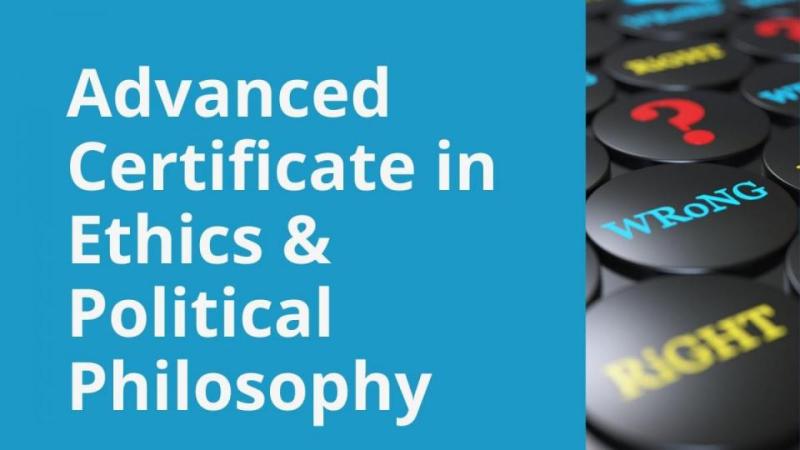What is a graduate certificate in philosophy and ethics?
A graduate certificate in philosophy and ethics is a specialized program typically offered at the post-baccalaureate level. It focuses on exploring philosophical theories, ethical frameworks, and critical thinking skills within the context of ethical decision-making, moral reasoning, and philosophical discourse.
Here's an overview of what this program might entail:
Curriculum: The curriculum for a graduate certificate in philosophy and ethics often covers a range of topics, including:
- Ethical Theories: Study of major ethical theories such as consequentialism, deontology, virtue ethics, and existentialism.
- Philosophical Ethics: Examination of ethical issues and debates in various contexts, such as bioethics, environmental ethics, business ethics, or applied ethics.
- Critical Thinking: Development of analytical and critical thinking skills to evaluate moral arguments and philosophical concepts.
- Metaethics and Normative Ethics: Exploration of the nature of morality, ethical language, and the principles guiding ethical behavior.
- Ethical Decision-Making: Practical applications of ethical theories in real-world situations, emphasizing ethical decision-making processes.
Purpose: A graduate certificate in philosophy and ethics aims to deepen students' understanding of moral philosophy, ethical reasoning, and the application of ethical principles in various fields. It provides a focused study on ethical theories and their implications in different contexts.
Duration: These programs typically range from six months to a year, depending on the institution and the structure of the curriculum. They are designed to provide a concentrated study in the area of philosophy and ethics without the extended commitment of a full graduate degree.
Target Audience: This certificate program might attract individuals from various backgrounds, including professionals seeking to enhance their ethical decision-making skills in their careers, educators interested in integrating ethics into their teaching, or those aiming to pursue further studies in philosophy or related fields.
Career Opportunities: While a graduate certificate in philosophy and ethics may not lead to specific job titles, it can complement careers in fields like law, healthcare, business, education, public policy, or social work by providing a strong foundation in ethical reasoning and critical thinking, which are highly valued in many professions.
Overall, this certificate program provides an intensive study of philosophical and ethical concepts, equipping individuals with the skills to navigate complex moral issues and make informed ethical decisions.
What does a graduate certificate program in philosophy and ethics involve?
Graduate certificate programs in philosophy and ethics offer a concentrated, focused study of philosophical and ethical concepts, typically aimed at individuals who want to:
- Deepen their existing knowledge: Enhance their understanding of philosophical and ethical theories, issues, and arguments.
- Gain professional credentials: Enhance their resumes for careers in fields like law, healthcare, education, business, or non-profit organizations where ethical reasoning and critical thinking are valued.
- Prepare for further study: Strengthen their foundation for pursuing a Master's degree in philosophy or a related field.
Program specifics will vary depending on the institution, but the general structure often includes:
Coursework:
- Core courses: Courses covering foundational philosophical and ethical theories, concepts, and methodologies. These might include areas like ethics, logic, metaphysics, epistemology, political philosophy, or bioethics.
- Elective courses: Options to delve deeper into specific areas of interest, like environmental ethics, applied ethics, feminism and philosophy, or philosophy of science.
- Seminars and independent study: Opportunities for focused discussions and research under the guidance of experienced faculty.
Requirements:
- Completion of a specific number of credit hours (usually fewer than a Master's degree).
- Maintaining a minimum GPA.
- Some programs may have specific prerequisites, like an undergraduate degree in philosophy or a related field.
Benefits:
- Intensive learning: Gaining a deeper understanding of philosophical and ethical concepts in a shorter timeframe compared to a full Master's program.
- Flexible options: Programs are often offered part-time and online, catering to working professionals or individuals with busy schedules.
- Network building: Interacting with fellow students and faculty, expanding your professional network within the field.
Things to consider:
- Program reputation: Compare program offerings and faculty expertise at different institutions.
- Admission requirements: Ensure you meet the specific prerequisites and application deadlines.
- Career goals: Tailor your course selections to align with your professional aspirations.
Graduate certificate programs in philosophy and ethics can be a valuable investment for individuals seeking to deepen their understanding of complex philosophical and ethical issues, enhance their professional qualifications, or prepare for further academic endeavors. By carefully researching and choosing the right program, you can embark on a rewarding journey of intellectual exploration and personal growth.













